Abstract
The article presents the results of the monitoring research of the educational Internet resources in Russian language, evaluation criteria and the prospects for the use of analyzed electronic resources during the study of Russian language and education in Russian, as well as in the process of professional activities related to the teaching of Russian language, the organization of open education in Russian and the implementation of Russian language training for different categories of persons, including bilinguals living in multi-ethnic, poly-linqual, multi-religious regions. Monitoring of 300 Russian-language educational Internet resources related to the teaching of Russian language was conducted by the experts in linguistics, information technology and special (defectological) education. Expert evaluation was carried out according to specially developed criteria. The authors employed general scientific methods such as synthesis, analysis, comparison, descriptive methods including methods of observation, generalization and classification as well as methods of statistical and quantitative analysis. The authors have identified and described 300 Russian-language educational Internet resources related to the study and teaching of Russian language, developed the evaluation system, created an electronic database with rating lists of the Internet resources, distributed both on the integral total criterion and on individual characteristics, carried out the monitoring of websites according to the stated criteria. Overall, there have been different criteria and web resources evaluation principles in the literature. Formed electronic database can help both content developers in terms of its further improvement and users in the course of studying or teaching Russian.
Keywords: Bilingualsevaluation criteriaeducational Internet resourcesmonitoringthe Russian language
Introduction
The research team of BSPU n. a. M. Akmulla have been working out a project «Internet resources related to the study of Russian language and education in Russian on the Internet and in the media» (Grant of the Ministry of Education and Science of the Russian Federation for the Russian Language Federal Targeted Programme 2016−2020) for 2 years. The programme is designed to promote the use, spread and proliferation of the Russian language in the country (including multi-ethnic, poly-lingual, multi-religious regions), to improve conditions for promoting the Russian culture, science, education in the world community through active communications policy. The urgency of the project is determined by internal and external conditions related to socio-political changes in the Russian Federation in recent years such as sense of national identity and a respectful attitude to the Russian language and culture, preservation of the national and cultural identities of the Russians living in other countries, the resulting necessity for learning Russian, language learning for working migrants, who came to Russia to pass the exam on knowledge of the Russian language; the Russian language education for citizens of foreign countries, including former citizens of Russia to raise competitiveness on the employment market. In this regard, the development of open education in Russian and teaching Russian as a native, non-native and foreign language to the Russian Federation citizens and representatives of other countries becomes more relevant and can be implemented through modern information technologies. The stated tasks are achieved through extensive information campaign in the media, the Russian-language educational Internet resources monitoring and the database on the Russian language learning and education in Russian on the Internet.
Problem Statement
Computer and remote language learning technologies, including Russian as a native, non-native and foreign language learning (Bogomolov, 2009; Nikitenko, Yanchenko, Nikitenko, & Deikina, 2017) are being actively developed in recent years (Bakar, Latif, & Yaacob, 2017; Milrud, 2012). A first description of the specifics of how the Russian-language Internet works (Badrakh & Shirnen, 2015; Moroslin, 2009); genre classification of websites (Kononenko & Sidorova, 2015; Moroslin, 2010) have been determined. The prospects of distance learning the Russian language (Azimov, 2014; Bondareva & Beloglazova, 2015) and the change of the career development system to remote mode were discussed (Lebedeva & Semenova, 2013). There are some kinds of advantages and disadvantages of the use of social media in the Russian language learning (Savitskaya, 2012). The special attention is paid to the methods of creation of educational materials based on resources, software and Internet tools (Nazarova & Grinberg, 2010; Yaroslavskaya, 2012).
Research Questions
The study involved Russian-language educational Internet resources, which diversity provides the necessity of monitoring.
Purpose of the Study
The purpose of the study was to conduct the research of 300 Russian-language educational Internet resources related to the Russian language learning and teaching and evaluate their efficiency and forecasting. The article presents the results of monitoring analysis of the Russian-language educational websites, evaluation criteria and the prospects for the use of analyzed electronic resources during the study of Russian language and education in Russian as well as in the process of professional activities related to teaching of Russian language, the organization of open education in Russian and the implementation of Russian language training for different categories of persons, including bilinguals, who live in multi-ethnic, poly-lingual, multi-religious regions.
Research Methods
Monitoring of 300 Russian-language educational Internet resources related to the teaching of Russian language was conducted by the experts in linguistics, information technology and special (defectologic) education. They established the following criteria to evaluate the condition and efficiency of the Russian language educational Internet resources:
I. Criteria related to the general information on the website:
1) the source of information (the author of an educational Internet resource): private / legal entity, expert / layman;
2) target audience (recipient, to whom the educational resource is intended to and to whom it will be useful): instructors, professors, teachers / students; those who speak/does not speak in Russian; Russian-speaking mono-linquals / bi- and poly-linquals; pupil / students; humanitarian / non-humanitarian;
II. Criteria for the experts in linquistics:
1) reliability, verifiability of information (scientific / unscientific, proved / unproved information is presented at the resource): has / has not references to particular sources of information, their reliability / unreliability);
2) relevance, novelty of information (is consistent / inconsistent with current scientific images, hypothesis, theories, knowledges); current / past data;
3) objective data: the point of view, opinion of one or more researchers, instructor;
4) engagement of the information in a socio-cultural context: has / has not references or mentions about social, cultural-historical events, facts, ignorance of which may have impact on the level of perception and understanding the information;
5) language aspect: informational content / conciseness, complexity / accessibility, accuracy / inaccuracy, consistency / inconsistency; absence of misprints, orthographic, grammar, stylistic mistakes;
6) method of giving the information: structured, systemic / randomness, diversity / consistency; adequacy of the use of illustrations (as a supplement to the text rather than a distraction), the absence of negative impact of advertising (if any);
7) diverse range of information on the types of materials: curriculum / theoretical courses / practicum / methodological recommendations / tests / techniques; text/ audio- / video-materials / online-courses; interactivity of the website;
III. Criteria for the experts in information technology:
1) technological effectiveness (if the website works on all platforms and browsers; if it is possible to view the website with different resolutions);
2) usability (the ease of use);
3) external links (links to the resource);
IV. Criteria for the experts in special (defectologic) education:
1) access to information on the website for persons with disabilities and health limitations;
V. Criteria for all the experts:
1) access to information (unpaid resource / paid resource; with or without registration, the information appears immediately or not);
2) attractive design.
The general logistics plan for the information search on the hybrid relevance of search queries has been developed for a sample of 300 Internet resources. The experts selected Russian-language educational websites by their conformity or non-conformity with the project objectives. Every expert went through 200 Internet resources on Yandex and Google search systems and completed the following sampling protocol (see table
The expert ____________________ (full name).
300 Russian-language educational Internet resources conforming to the project objectives were selected according to the first sampling results.
A dedicated website «Automated System of Comparative Evaluation of BSPU named after M. Akmulla» with the expert evaluation based on stated criteria has been created to establish an electronic database (figure
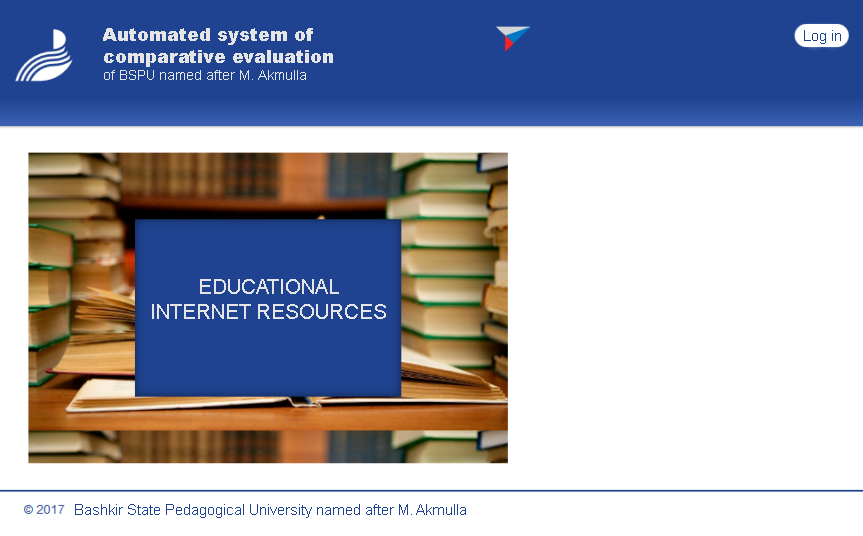
Findings
The monitoring of Russian-language educational Internet resources had demonstrated that following websites got the highest scores for most of the criteria (Figure
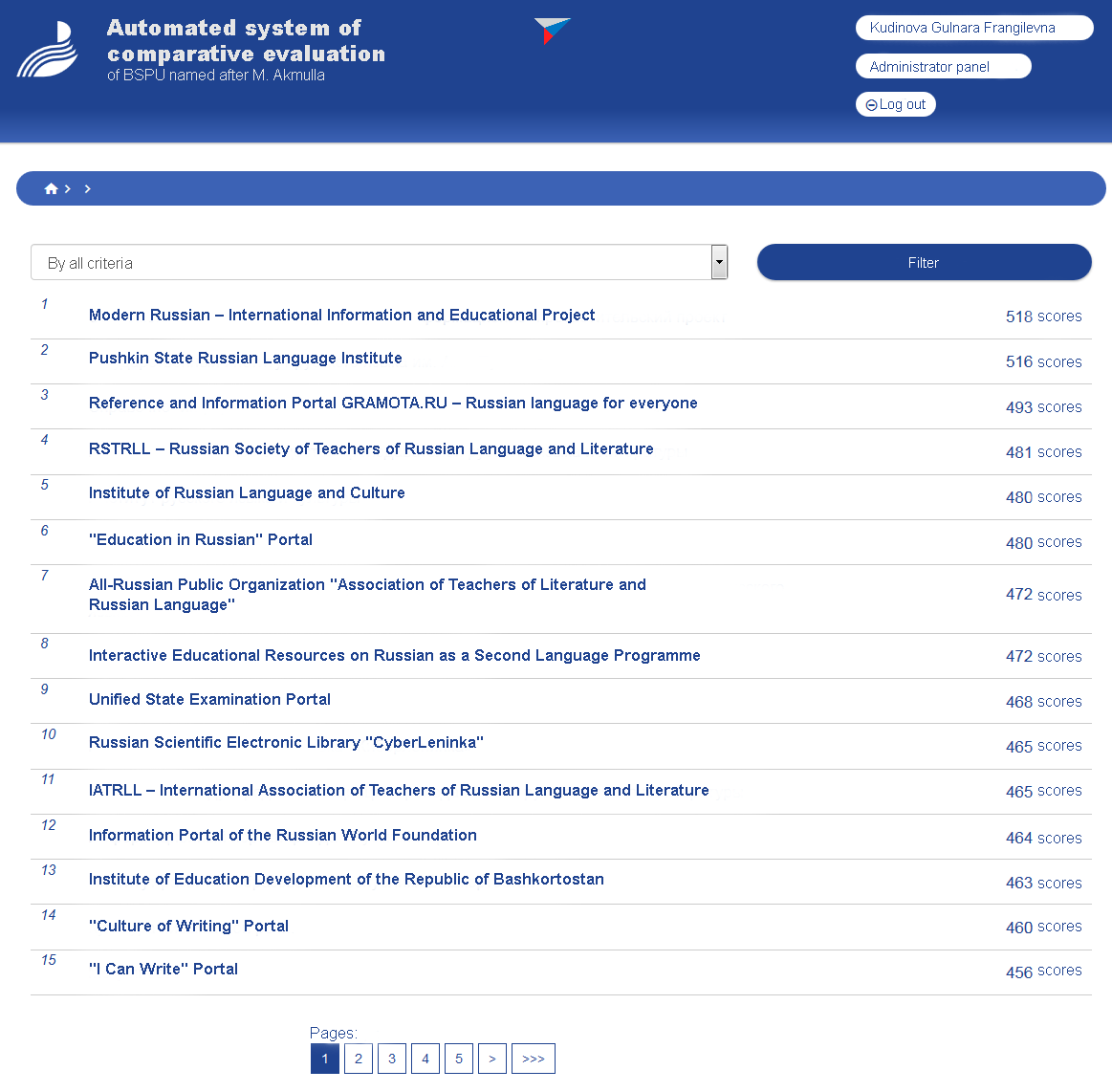
The monitoring results based on different criteria (the highest score for most of the criteria, usability, attractive design, etc.) are displayed on the website as diagrams and figures. The diagrams indicate the websites scores for all the criteria (Figure
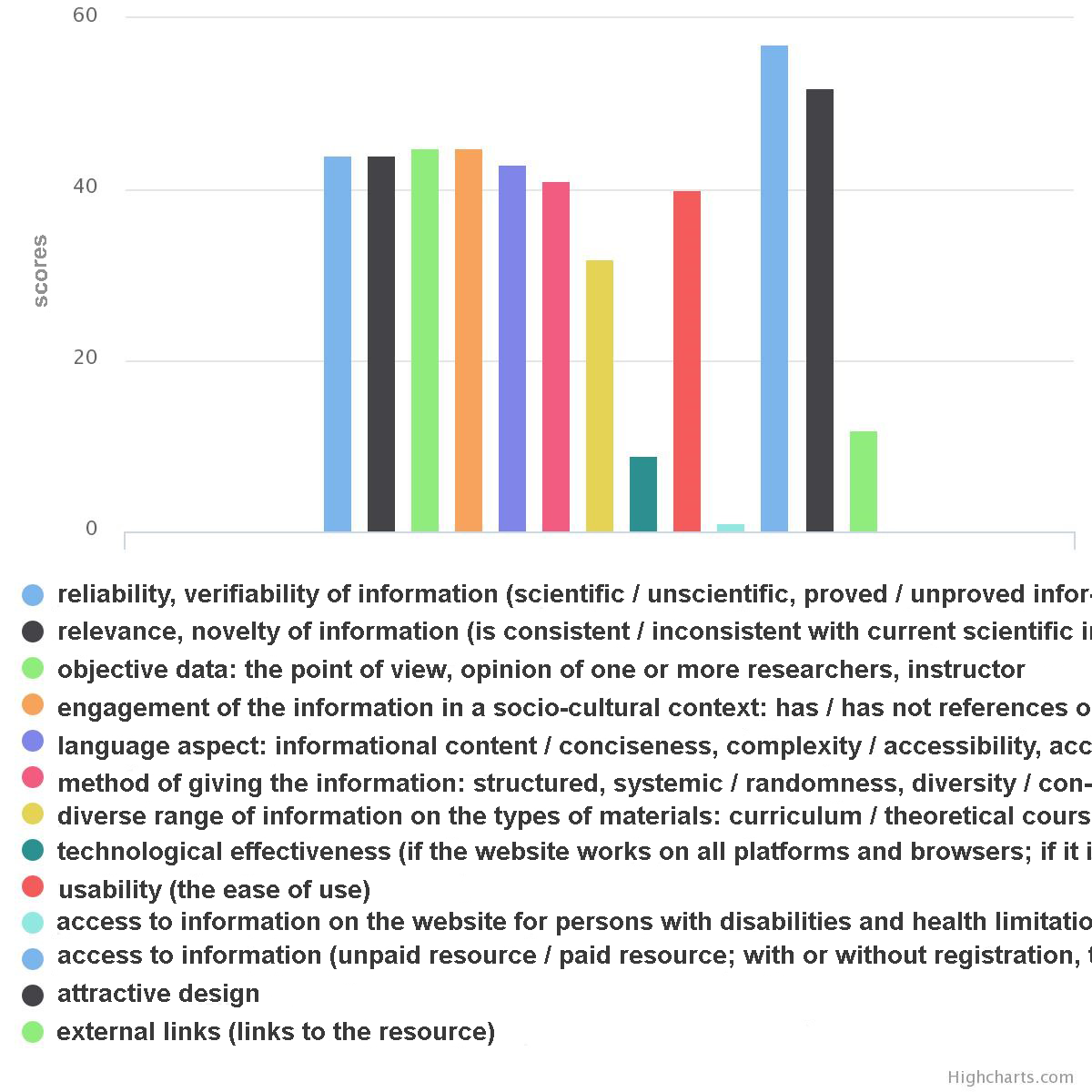
Moreover, the rating of web resources for each criteria can be found on the website «The automated system of comparative evaluation of BSPU named after M. Akmulla». Pushkin State Russian Language Institute, Manuscript, RSTRLL – Russian Society of Teachers of Russian Language and Literature scored highest for «reliability, verifiability of information» (Figure.
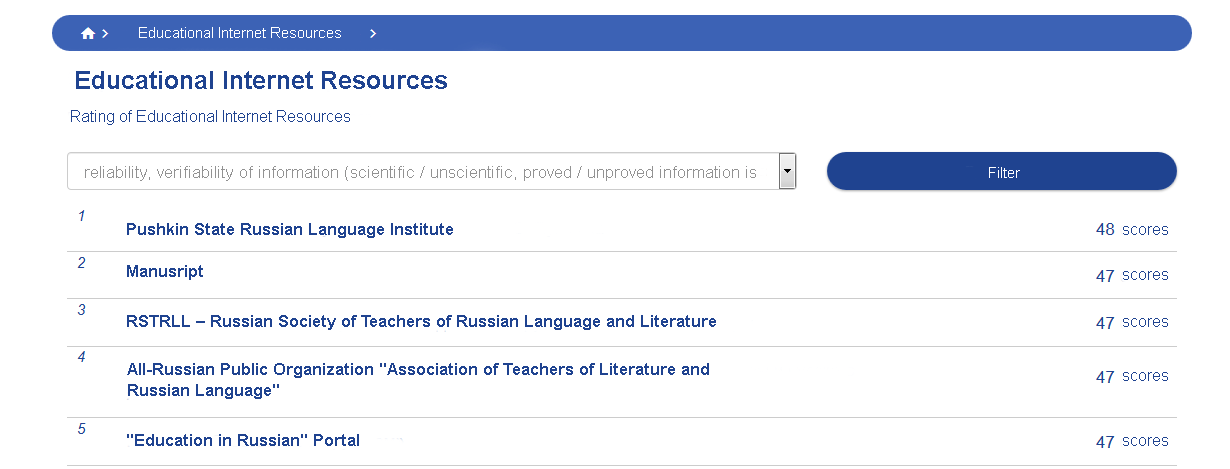
The website of Pushkin State Russian Language Institute, "Education in Russian" Portal, Institute of Russian Language and Culture scored high for the criterion of «relevance, novelty of information» : (Figure
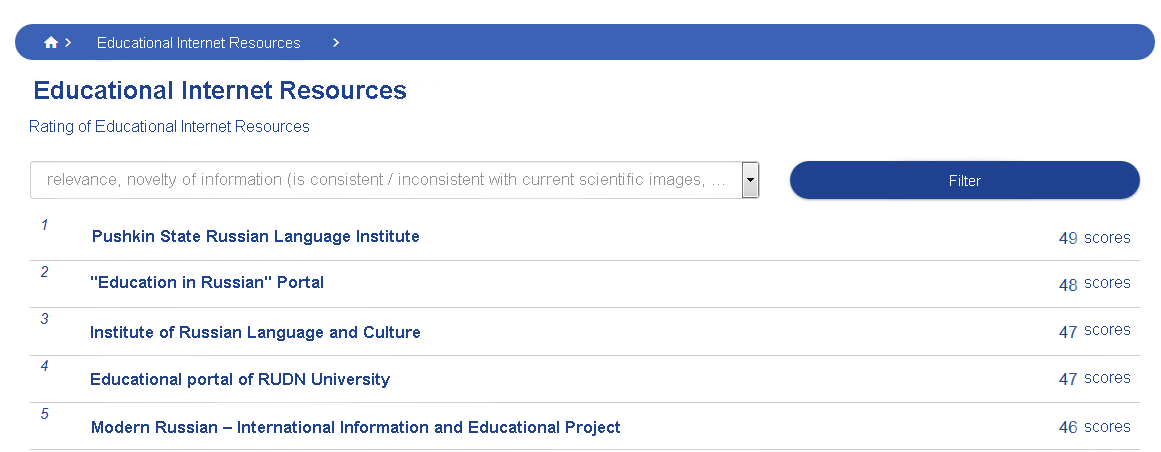
Electronic database was published on a dedicated BSPU website and submitted to the Pushkin State Russian Language Institute under a licensing agreement and published on the Internet-portal «Education in Russian» under the Russian language promotion programme initiated by the Government Council on the Russian language and The Ministry of Education and Science of the Russian Federation.
The Internet resources are classified according to the different criteria in the sources reviewed. For example, the study singles out the following resources in terms of type of the information
Different (or the same) criteria and principles for evaluating the web resources are found in literature and web resources (Sidorova, 2012). The sites are more usefully evaluated at total integral criterion, which includes:
But overall, a wide range of constraints to classification and use of electronic educational resources was noted (Bulakina, 2005). This is connected with the fact that 1) resources are presented randomly on the Internet, it is difficult to perform website search and define its description and connection with other resources; 2) resources differ from each other in relevance, completeness, type of description, the level of reporting and access to the information; 3) methods of reporting, the balance between textual and audiovisual information are determined by the authors, there is no standards in this field.
There are various points of view and we believe that electronic database formed as the result of monitoring of the Russian-language educational Internet resources on teaching and learning the Russian language, rating-list of reviewed websites will help content developers to improve it and users to learn the Russian language and get an education in Russian, get a qualification in Russian language teaching and organizing the open education in Russian, teaching people of different categories.
Conclusion
Therefore, establishment of the database indicating the results of monitoring of the Russian-language educational Internet resources on teaching and learning the Russian language, insertion of the monitoring results on the BSPU website and Internet portal of the Ministry of Education and Science of the Russian Federation «Education in Russian» give the opportunity to support and promote the Russian language as state, native, non-native, foreign language and to teach the people of different categories, provide methodological and training support to teachers in the use of interactive teaching methods, information technologies and the Internet-resources.
Acknowledgments
This research was conducted with the financial support of the Russian Federation through the Ministry of Education and Science of the Russian Federation (The programme «Promotion of the resources related to the Russian language learning and getting an education in Russian in the media and on the Internet») on the third direction «Development of education in Russian and teaching the Russian language» of the Russian Language Federal Targeted Programme 2016-2020.
References
- Azimov, Eh. G. (2014). Ispol'zovanie MOOK (massovykh otkrytykh onlajn-kursov) v obuchenii russkomu yazyku kak inostrannomu (dostizheniya i perspektivy) [The use of MOOKs (massive open online courses) in the process of teaching Russian as a foreign language (achievements and prospects)]. RUDN Journal of Language Education and Translingual Practices, 4, 124-129.
- Badrakh, А., & Shirnen, Ts. (2015). K voprosu o funkcionirovanii russkogo yazyka v internet-srede [On the functioning of Russian language on the Internet]. Novosibirsk State Pedagogical University Journal, 5(27), 134-141.
- Bakar, N. A., Latif, H., & Yaacob, A. (2017). Fusion of Technology with Language Learning: Blog Community. 3L: The Southeast Asian Journal of English Language Studies, 23(4), 200-211.
- Bogomolov, А. N. (2009). Internet-tekhnologii v obuchenii russkomu yazyku kak inostrannomu [Internet technologies in the process of teaching Russian as a foreign language]. CIE MSU Methodology, 1, 40-44.
- Bondareva, О. V., & Beloglazova, L. B. (2015). Podhody v distancionnom obuchenii russkomu yazyku kak inostrannomu [The approaches to the distance learning Russian as a foreign language]. RUDN Journal of Informatization in Education, 2, 102-104.
- Bulakina, M. B. (2005). Informacionnaya sistema upravleniya resursami v obrazovatel'nykh internet-katalogakh [Resource management information system in educational Internet guides] (Doctoral dissertation). Retrieved from: https://new-disser.ru/_avtoreferats/01002745884.pdf.
- Kononenko, I. S., & Sidorova, E. A. (2015). Zhanrovye aspekty klassifikacii veb-sajtov [Genre aspects of web sites classification]. Software Engineering, 8, 32-40.
- Kravchenko, A. A. (2015). Pravovoj rezhim internet-sajta kak kompleksnogo ob"ekta intellektual'noj sobstvennosti [Web-site legal framework as an intellectual property] (Doctoral dissertation). Retrieved from: http://dis.rgiis.ru/files/dis/d40100102/ Kravchenko/160428-avtoreferat_kravchenko_release-2.pdf.
- Lebedeva, M. B., & Semenova, T. V. (2013). Distancionnye obrazovatel'nye tekhnologii v sisteme povysheniya kvalifikacii pedagogicheskikh kadrov [Distance educational technologies in the system of teachers professional development]. Man and Education, 1(34), 117-122.
- Milrud, R. P. (2012). Primenenie informacionnykh tekhnologij v obuchenii inostrannym yazykam i kul'tur [Using of information technologies in teaching foreign languages and culture]. Tambov University Journal: Liberal Arts, 5, 211-217.
- Moroslin, P. V. (2009). Yazyk Interneta kak ob"ekt lingvisticheskikh issledovanij [The language of the Internet as an object of linguistic research]. RUDN Journal of Linguistics, 3, 10-17.
- Moroslin, P. V. (2010). K voprosu o zhanrovoj klassifikaciya resursov Interneta [On the issue of genre classification of Internet resources]. Tambov University Journal, 8(88), 154-160.
- Nazarova, L. V., & Grinberg, G. M. (2010). Razrabotka uchebno-metodicheskikh materialov na osnove obrazovatel'nykh informacionnykh tekhnologij [Development of teaching materials based on educational Information Technologies]. Actual Problems of Aviation and Aerospace, 6, 425-426.
- Nikitenko, Z. N., Yanchenko, V. D., Nikitenko, E. A., & Deikina, A. D. (2017). Tvorcheskaya samorealizaciya uchashchikhsya v processe izucheniya russkogo yazyka kak inostrannogo [Creative self-realization of students in the process of learning Russian as a foreign language]. Novosibirsk State Pedagogical University Journal, 7(2), 7-19.
- Savitskaya, G. V. (2012). Social'nye seti kak instrument izucheniya russkogo yazyka [Social networks as a tool for learning Russian]. Russian Language Abroad, 1, 102-104.
- Sidorova, A. G. (2012). Kompozicionno-graficheskij analiz sajtov organov vlasti (na materiale Altajskogo kraya) [Compositional and graphical analysis of the websites of the authorities (on the material of the Altai region)]. Modern Studies of Social Issues, 9(17), 44.
- Yaroslavskaya, I. I. (2012). Metodika sozdaniya uchebnykh materialov po russkomu yazyku kak inostrannomu (s pomoshch'yu resursov Interneta) [The technique of creating teaching materials for Russian as a foreign language (with the help of Internet resources)]. Siberian Pedagogical Journal, 5, 80-83.
Copyright information

This work is licensed under a Creative Commons Attribution-NonCommercial-NoDerivatives 4.0 International License.
About this article
Publication Date
15 November 2020
Article Doi
eBook ISBN
978-1-80296-092-1
Publisher
European Publisher
Volume
93
Print ISBN (optional)
-
Edition Number
1st Edition
Pages
1-1195
Subjects
Teacher, teacher training, teaching skills, teaching techniques, special education, children with special needs, computer-aided learning (CAL)
Cite this article as:
Kudinova, G., Kapisheva, T., Popova, Y., & Kurbangaleeva, G. (2020). Russian-Language Educational Resources: The Monitoring Results. In I. Murzina (Ed.), Humanistic Practice in Education in a Postmodern Age, vol 93. European Proceedings of Social and Behavioural Sciences (pp. 574-582). European Publisher. https://doi.org/10.15405/epsbs.2020.11.59

